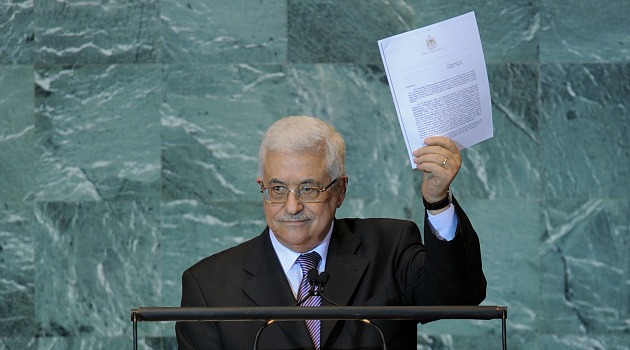UPDATES
UN vote on PA upgrade to “non-member state” status
November 29, 2012

Update from AIJAC
November 29, 2012
Number 11/12 #06
The Palestinians introduced a much-anticipated resolution giving “Palestine” a status of “non-member state” at the UN General Assembly on Monday. A vote is expected today, New York time, which is Friday here, and the Australian Government’s decision to abstain has been much in the news given that Prime Minister Julia Gilliard was reportedly forced by cabinet and caucus colleagues to abandon her own preference to vote “no”. This Update is devoted to analysis of the significance and likely effect of the resolution – which is widely expected to pass easily.
First up is the always lucid David Harris, Executive Director of the American Jewish Committee – comparing and contrasting the Palestinian UN bid to another UN milestone whose anniversary is this week – the 1947 UN partition plan resolution for Palestine. One crucial difference he notes is that the 1947 decision was the result of months of “intensive investigation into the best outcome for two competing nationalisms — Jewish and Arab”, unlike the current Palestinian bid. He also points out that the Palestinian bid, in its unilateralism, seems to have more parallels with the Arab decision to reject and defy partition in 1947, than with the partition resolution itself. For his argument in full, CLICK HERE.
Next up a noted Israeli peace negotiator and a noted senior Israeli general team up to thrash out the effects of the UN bid on the peace process and Israel’s relations with the Palestinians more generally. They conclude that the chances that the move will in any way enhance peace prospects are “slim to none”, that it detracts from the”negotiations, hard work, painful compromises, and constructive measures” genuinely needed, and that, even for the Palestinian side, the change in legal status has a number of clear downsides, including possibly making Palestianian leaders legally liable for terrorism, and weakening the PA’s claim to represent disapora Palestinians. They call for an agreed temporary delay in the UN process in an attempt to start a negotiating process that could lead to a joint resolution, acceptable to Israel, that would include agreed language on key final status issues such as border and security arrangements. For their analysis in full, CLICK HERE.
Finally, Canadian historian Prof. Gil Troy addresses one of the key arguments being made for supporting the resolution – namely that PA President Mahmoud Abbas and his Fatah movement could use the boost the resolution might bring them in Palestinian public opinion, especially as the only alternative appears to be Hamas. He offers a number of reasons that, despite such arguments, the move is a bad idea: the motives for it look justifiably suspect from an Israeli point of view, this move will likely cause Israeli positions to harden and exacerbate other pathologies that prevent progress and make peace more difficult, and it amounts to a repudiation of the Oslo Accords. He places this latest move in the context of the process in the UN in the 1970s, whereby the Soviet-Arab coalition essentially ruined any hope of the world body ever playing a constructive role in Middle East peacemaking by using their numbers in it to spearhead a campaign to delegitimise Israel. For the rest of Troy’s insightful discussion, CLICK HERE. Another argument that the bid is not a good way to strengthen Abbas against Hamas comes from Jonathan Tobin of Commentary.
Readers may also be interested in:
- Good analysis of the international law problems with the Palestinian UN bid from American international law experts Rene Louis Beres and Robert Bainbridge, while Israeli experts Oded Eran and Ronnie Sabel look at how the bid will legally affect the status of the Palestinians at the UN and other international bodies.
- Israeli historian Moshe Dann argues that Palestinian statehood has very little to do with what they Palestinians are now doing at the UN.
- Israel will reportedly react in a relatively low key way to the bid, according to Herb Keinon of the Jerusalem Post.
- The reliably well-informed Khaled abu Toameh says PA President Mahmoud Abbas now seems to be making a conscious decision to try to collaborate with Hamas, previously his greatest enemy.
- The Jerusalem Post had not one but two good editorials on the UN bid question – here and here. The paper also had a good editorial on the lack of credit Israel gets for supporting Gaza with aid, electricity, and other goods despite the rocket attacks and recent mini-war.
- Palestinian says they want to use their newly declared status to get Israel tried in international courts for supposedly murdering Yasser Arafat. More on the exhumation of Arafat’s body this week to determine the cause of death is here.
- Claudia Rossett takes on the skewed priorities of the UN in the Middle East, especially during the recent Gaza conflict.
- Isi Leibler writes to explain why the Israeli Government’s domestically unpopular decision to halt the Gaza fighting and accept a ceasefire when it did was the right call. But Israeli strategic analyst and former general Giora Eiland argues more could have been achieved.
- In the aftermath of the success of the “Iron Dome” defensive system in the Gaza conflict, Israel has successfully tested “David’s Sling”, the next component of its overall rocket and missile defense system, due for deployment in 2014. Story and video here.
- Some comments on the implications of technological defence systems against terrorism comes from former senior American official Elliot Abrams.
- British General Richard Kemp discusses Israel’s efforts to avoid civilian casualties during “Operation Pillar of Defence”.
- Some examples from the many stories and comments now appearing at AIJAC’s daily “Fresh AIR” blog:
- For those who didn’t see it in yesterday’s Australian, AIJAC National Chairman Mark Leibler had an op/ed explaining why support for the UN bid would be counter-productive for anyone who wants a two-state peace.
- Sharyn Mittelman on arrests made of suspects in last week’s Tel Aviv bus bombing, and what they can tell us about Israel’s anti-terror laws.
- Or Avi-Guy assesses the increasingly common claim that the recent round of conflict surrounding Gaza began with the death of a 13-year-old Palestinian boy on Nov. 8. Plus, she had another post on the belated and half-hearted condemnations of rocket attacks on Israel by NGOs supposedly dedicated to human rights.
- Daniel Meyerowitz-Katz assembles the evidence confirming that the rocket launching and other military activity in civilian areas by Palestinian groups was a major contributor to the civilian death toll in the Gaza conflict.
- Video of AIJAC Executive Director Dr. Colin Rubenstein discussing the conflict on Sky-TV on Nov. 19.
- For those who didn’t see it in yesterday’s Australian, AIJAC National Chairman Mark Leibler had an op/ed explaining why support for the UN bid would be counter-productive for anyone who wants a two-state peace.
A Fateful Week for the Middle East
Huffington Post, Posted: 11/26/2012
This week ushers in two significant events.
The first is a milestone anniversary. On November 29, 1947, the UN General Assembly, by a vote of 33 in favor, 13 opposed, and ten abstentions, endorsed Resolution 181, otherwise known as the Palestine Partition Plan.
That plan recommended the division of the land, then under British mandatory rule, into two states — one Jewish, the other Arab.
While the Jewish side was unhappy that the proposed boundaries of the Jewish state reduced the land envisioned in the 1917 Balfour Declaration to one-eighth its original size, it nevertheless accepted the plan.
However, the Arab world rejected the very notion of partition, since it would not accept the legitimacy of any sovereign Jewish entity in the region.
The Iraqi delegate to the UN stated, “I wish to put on record that Iraq does not recognize the validity of this decision.”
His view was echoed by his Syrian counterpart, who declared: “Gentlemen, the [UN] Charter is dead. But it did not die a natural death; it was murdered, and you all know who is guilty. My country will never recognize such a decision.”
Their defiant views were rejected by a decisive majority of UN member states at the time. Nor did they find sympathy with UN Secretary General Trygve Lie.
In his memoirs, In the Cause of Peace: Seven Years with the United Nations, he wrote: “The partition of Palestine and the consequent creation of the State of Israel became one of the most dramatic chapters of early United Nations history. As Secretary-General, I put the full weight of my office consistently behind the Organization’s decision from the time it was first taken.”
Later, in describing the actual events of May 1948, the Secretary-General stated: “The Arab states launched their invasion of Palestine with the end of the [British] Mandate. This was armed defiance of the United Nations [emphasis added], and they openly proclaimed their aggression by telegraphing news of it to United Nations headquarters.”
Why is it so important, 65 years later, to recall these events?
First, to underscore the UN’s deliberative process. In 1947, the UN acted only after intensive investigation into the best outcome for two competing nationalisms — Jewish and Arab.
Second, to bear in mind that a two-state solution was the recommendation of the UN itself, and that the Jewish side accepted it both in principle and in practice.
And third, to remember that it was the UN Secretary-General who labeled the Arab military response, seeking the annihilation of the fledgling Jewish state, “armed defiance of the United Nations.”
Now fast forward to this week.
Palestinian Authority President Mahmoud Abbas has demanded recognition of “Palestine” as a non-member observer state of the UN, a status currently held by the Holy See and previously by Switzerland, until it became a full member in 2002.
The issue is expected to come before the UN General Assembly on November 29, the same day, 65 years ago, that the world body endorsed the Partition Plan.
But unlike that plan, this Palestinian gambit was not the result of UN study missions and months-long discussions involving a range of countries. On the contrary, it is a Palestinian idea, endorsed, predictably, by the Arab League and the Organization of the Islamic Conference, which will have no beneficial impact on the ground.
If the Palestinian Authority today is serious about overcoming its many past rejections of a two-state deal, then progress can only be achieved at the negotiating table with Israel, the other party to the conflict.
Turning instead to the UN is actually avoidance diplomacy, bypassing the one party that really counts.
Since 1947, history has moved on. Unlike the situation then, today a Palestinian state can only emerge as a result of direct talks between the parties themselves.
Those nations truly committed to advancing the peace process should therefore think twice about what the Palestinians are asking them to endorse.
Support for this Palestinian move will only give license to the internationalization of the conflict, open the doors for an upgraded “Palestine” to wage war against Israel in the International Criminal Court and other UN agencies, and thereby widen, not narrow, the gulf between the parties.
And finally, what exactly constitutes the borders of Mr. Abbas’ “Palestine”?
For example, do they include Hamas-ruled Gaza, which he purports to represent but has been unable to enter for over five years, and over which he has no governing authority?
Yet even assuming he did represent it, how could he explain to UN member states the recent deadly violence that emanated from Gaza? This was a brazen act of aggression against Israel, a UN member state – an act which Mr. Abbas has refused to condemn.
Having made one tragic mistake in 1947 by spurning a proposed two-state deal, will the supporters of the Palestinian cause now make another in 2012 by rebuffing Israel’s latest offer to negotiate a two-state deal, and instead seek a UN end-run that will lead nowhere?
Given the record, I wouldn’t bet against it.
Back to Top
————————————————————————
Mahmoud Abbas’ UN Gambit will not Bring Peace
Gilead Sher and Amos Yadlin
INSS Insight No. 388, November 27, 2012
Amidst – or perhaps immediately after – the war in Gaza, international attention refocused on the Israeli-Palestinian political arena. On November 29, 2012 the PLO under Palestinian Authority President Mahmoud Abbas is likely to request a United Nations vote on international recognition of Palestine as a “non-member state” (“permanent observer”) of the United Nations, resuming the statehood initiative that began last year. The date marks the anniversary of the 1947 General Assembly resolution on the partition of the British Mandate in Eretz Israel into two states – one Jewish and one Arab.
Abbas’ appeal to the UN is expected to win a majority. Earlier this month, Sudan, which has systematically massacred its own people, was elected to the UN Economic and Social Council, which regulates human rights, women’s rights, and freedom of speech, by 176 out of the 193 UN member-states. The UN – where the rotating presidency of the Security Council can be held by Libya, as in 2008 – is bound to vote by overwhelming majority in favor of the Palestinian Authority’s request.
However, the likelihood that the Palestinian move may even slightly promote a resolution to the Israeli-Palestinian conflict is slim to none. Peace and security are achieved through negotiations, hard work, painful compromises, and constructive measures – not via UN votes, upgraded UN statuses, speeches, or media interviews. This is true for Israelis and Palestinians alike.
While the acts of terrorism and indiscriminate attacks on Israeli civilians by Hamas will not bring the reality of two states for two peoples any closer, neither will Abbas’ move. The Palestinian bid, if approved, has serious implications for both sides.
The bid may lead to a strong reaction on Israel’s part, e.g., cancellation of parts or all of the Interim Agreement (Oslo II), which was signed in 1995 but remains in effect in the absence of a permanent agreement. Since the PA was first established by the Oslo process, this may lead to its overall collapse – an outcome that would be welcomed by extremists on both sides. The lack of any contractual framework between Israel and the Palestinians might under extreme circumstances lead to efforts by the Palestinians toward the unilateral establishment of an armed Palestinian state that may endeavor to form military alliances with Israel’s enemies, conduct foreign relations, demand diplomatic immunities, and declare East Jerusalem the sole capital of the “Palestinian state.” Such actions could lead to legal efforts to alter the status of Jewish settlements in Judea and Samaria, including the large settlement blocs that both sides have largely acknowledged would be likely to remain a part of Israel as part of a negotiated settlement. Moreover, it would undoubtedly provoke unilateral Israeli measures in response, such as the application of Israeli law to Area C or economic sanctions by both Israel and the US, which, in the absence of a negotiated economic regime, may lead to the collapse of the already insolvent Palestinian Authority.
Moreover, although non-state members cannot vote in the General Assembly, upgrading the Palestinian Authority’s UN status may enable it to join international treaties and various UN organizations and institutions. Significantly, it may pave the way for PA participation in international tribunals, most problematic of which is the International Criminal Court (ICC). Granting the PLO the ability to drag Israel in front of the ICC would enable any person or organization – not just PA officials – to open international criminal procedures against Israel. This might not only come to restrain future Israeli military activity, a measure of Israel’s sovereign right to self-defense, but it would add yet another dimension to the international campaign to delegitimize the State of Israel.
The picture is likewise mixed for the Palestinians. First, Palestinian acceptance at the ICC would make it possible for Abbas and the PA to be held legally accountable at The Hague for the war crimes of Hamas and other Palestinian terrorist groups. Second, international law does not generally recognize a state’s’ “right” to represent minority groups that do not reside within its sovereign territory. The PA’s current status as a UN “entity” allows for its broad representation of the Palestinian diaspora, including the many refugees scattered across Jordan, Syria and Lebanon, and elsewhere. Elevating the PLO’s status to a non- member state (permanent observer) within the 1967 lines will considerably hamper the Palestinian Authority’s ability to portray itself as the legitimate representative of millions of Palestinian refugees and their descendants who are neither citizens nor permanent residents. Moreover, UN recognition of a Palestinian state may obviate the need for the existence of UNRWA (the United Nations Relief and Works Agency for Palestine Refugees in the Near East) and lead to the demand to cancel its mandate.
Opposition to Abbas’ UN bid stems from its unilateral approach to what can only be resolved bilaterally – namely, a political settlement between Israel and the Palestinians. According to the principles of Oslo, the core issues in dispute must be resolved through a bilateral dialogue and a negotiated agreement between the parties. Both the Oslo Accords
and the Wye River Memorandum prohibit unilateral actions by either party that may infringe upon the rights of the other.
However, if Mahmoud Abbas were to suspend his appeal to the General Assembly in favor of coordinated progress, the United States or the Quartet could try to ensure future Israeli-Palestinian negotiations on the basis of the Clinton parameters, the Roadmap, or the Arab Peace Initiative, over a defined period of time agreed upon by all parties in advance. If exhaustive dialogue efforts fail to reach any mutual understandings, Abbas will be free to resume his UN initiative. If progress is made, a stronger joint Israeli- Palestinian appeal could be made to the General Assembly that includes the resolution of at least two core issues: borders and security arrangements. Such a move would be a positive step that complements, rather than contradicts, negotiations between the parties and the vision of two states for two peoples. Any such progress would enable the international community and the US to play a direct and constructive role in future negotiations and create a regional front against a nuclear Iran.
The Zionist vision of a Jewish homeland in Israel demands a democratic political solution to the Israeli-Palestinian conflict. A demilitarized, stable, and prosperous Palestinian state alongside a Jewish and democratic Israel is a common interest of both sides. The chance for peace is more important than the UN gambit.
Gilad Sher and Maj. Gen. (ret.) Amos Yadlin are respectively a senior research fellow at and the Director of the Institute for National Security Studies at Tel Aviv University.
Back to Top
————————————————————————
Center Field: Why Israel should say “N O” to the Palestinians’ UN UDI
Gil Troy
Jerusalem Post, Tuesday Nov 27, 2012
Gil Troy is Professor of History at McGill University and a Shalom Hartman Engaging Israel Research Fellow in Jerusalem. His latest book “Moynihan’s Moment: America’s Fight Against Zionism as Racism” was just published.
Tags: Israel





